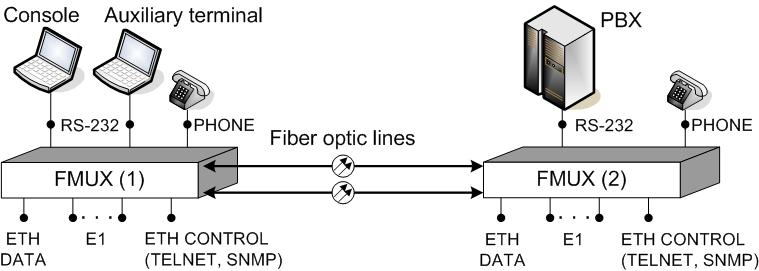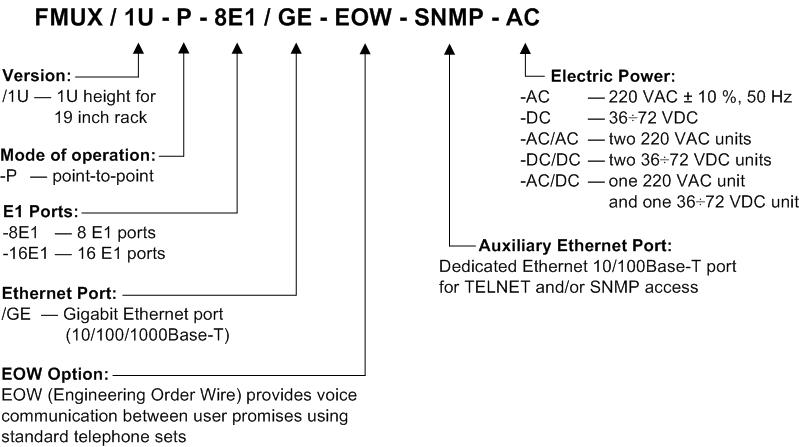|
|
|
Fiber Optic Multiplexers FMUX/1U-P (Gigabit Ethernet)
Discontinued, recommended replacement is: FMUX/1U-R, FMUX/1U-L

|
Features
|
Pair of FMUX/1U-P devices with Gigabit Ethernet ports support transmission of 8 or 16 E1 channels
and one Ethernet
In dual line operation (for both single and dual fiber lines) 1+1 automatic failover switching between two lines on receive is supported.
1+1 power protection supported if ordered with two power supply units (220 VAC and/or 36 to 72 VDC).
Device maintenance is achieved by the console (the ANSI terminal connected to the device through the RS-232 interface) or by network by TELNET protocol. SNMP maintenance is also supported.
All ports (E1 and Gigabit Ethernet) transmission over the fiber link is transparent. All E1 channels have independent sync signals with their own unique frequencies.
There are LED indicators for optical transceivers and data ports state, loops and test mode indication located on front panel of the device.
Integrated optical line tester is console controlled. Uses pseudo random bit sequence generator for fiber link testing.
Remote device management is available by remote login feature. Service data exchange is supported by additional service channel using same optical link.
Device firmware may be updated by network.
Shown below is a typical application example:

In the example above E1 ports and the Gigabit Ethernet port (connector «ETH DATA») transfer independently through the fiber optic link. The max link length depends on type of SFP transceivers and fibers used. Both single and double fiber transceivers may be used. If one of transceivers fails to receive input signal then automatic failover switching to receive signal from another line will be performed (this feature may be disabled by configuration). In the drawing above the FMUX (1) device is equipped with the console terminal. To control the FMUX (2) and to monitor its state the remote login to the second device from the console of the first device may be used. TELNET and SNMP access to both devices supported if LAN is connected to them (through «ETH CONTROL» connectors). The EOW feature (optional) may be usable for maintenance personnel. Standard telephone sets (connected to «PHONE» connectors) may be used for voice communication between user premises, where these devices are located. There is the ability to transfer the RS-232 terminal data through the link; in the example discussed the auxiliary terminal connected to the FMUX (1) device auxiliary port (RS-232 connector) is used to control the PBX connected to the auxiliary port (RS-232 connector) of the FMUX (2) device.
Ordering:

Currently available models are listed in Prices. Please, contact technical support if you are unsure which model to choose.
| Optical transceiver | |
|---|---|
| Nominal bit rate | 1,25 Gbit/s |
| Version | SFP (Small Form-factor Pluggable), hot pluggable |
| Standards compliance | SFP MSA (INF-8074i), ITU-T G.695, FC-PI V2.0 |
| Number of transceivers per device | 1 or 2 |
| E1/G.703 port | |
| Nominal bit rate | 2048 kbit/s ±50 ppm |
| Line code | HDB3 |
| Framing | Transparent signal transmission; both framed (G.704) and unframed signals supported |
| Error detection | Bipolar violation |
| Line impedance | 120 Ohm (twisted pair) |
| Receive signal attenuation range | From 0 to -6 dB |
| Jitter attenuation | In accordance with G.823 and G.742 |
| Connector type | RJ-48 (female 8 pins) |
| Gigabit Ethernet (10/100/1000BaseT) port | |
| Interface type | IEEE 802.3 10BASE-T/100BASE-T (100BASE-TX)/1000BASE-T (1000BASE-TX) |
| Transmission media | UTP Cat. 5e |
| Mode | 1000 Mbps full duplex, 100 Mbps full duplex, 100 Mbps half duplex, 10 Mbps full duplex, 10 Mbps half duplex, or autonegotiation |
| Connector type | RJ-45 (female) |
| Console port | |
| Interface type | RS-232 |
| Nominal bit rate | 9600 bit/s |
| Protocol | Asynchronous, 8 bit/symbol, 1 stop bit, no parity |
| Modem control signals | Not supported |
| Connector type | RJ-45 (female) |
| Auxiliary RS-232 port | |
| Interface type | RS-232 |
| Bit rate | Up to 38.4 kbit/s |
| Protocol | Asynchronous |
| Modem control signals | Not supported |
| Connector type | RJ-45 (female) |
| Auxiliary Ethernet (10/100BaseT) port | |
| Interface type | IEEE 802.3 10BASE-T/100BASE-T (100BASE-TX) |
| Transmission media | UTP Cat. 5 |
| Mode | 10/100 Mbps, autonegotiation |
| Connector type | RJ-45 (female) |
| EOW port ("-EOW" option) | |
| Purpose | Voice communication between user premises by standard telephone sets |
| Audio tones | Ringing, engaged and howling |
| Called party ringing tone simulation | By internal device buzzer |
| Connector type | RJ-11 (female) |
| Diagnostic modes | |
| Loopbacks | Local E1, remote E1 tributary, common digital |
| Optical line tester | Integrated |
| Control and monitoring | |
| By ANSI terminal | Through console port or by remote login |
| Using network | TELNET and SNMP access from LAN |
| Alarm supervision | |
| LEDs indication | Malfunction or failure of fiber optic link or enabled ports |
| Audio alarm signal | Failure of fiber optic link or any of enabled ports (E1, Gigabit Ethernet). Audio alarm can be disabled by configuration |
| Alarm signalization by network | Issuing SNMP traps in case of failure of fiber optic link or any of enabled ports (E1, Gigabit Ethernet) |
| Physical | |
| Case type | 1U metal box for 19 inch rack |
| Case dimensions | 434 mm × 207 mm × 44 mm |
| Weight | 2.0 kg |
| Power source | |
| «AC» models | 220 VAC ± 10%, 50 Hz |
| «DC» models | 36 to 72 VDC |
| Number of power supply units | 1 or 2 |
| 1+1 power protection | Supported if ordered with two power supply units («AC/AC», «DC/DC», «AC/DC») |
| Power consumption | 11 W max |
| Environment | |
| Range of working temperatures | 0° to +50°С |
| Range of storing temperatures | -40° to +70°С |
| Relative humidity | 0 to 80 %, non-condensing |
![]() Installation and Operating Manual (in Russian)
Installation and Operating Manual (in Russian)
Return to Fiber Optic Modems and Multiplexors or Digital Communication Equipment
Copyright © 1996-2026 Cronyx
